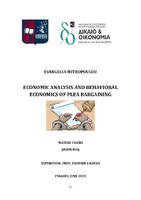Economic analysis and behavioral economics of plea bargaining
Η οικονομική ανάλυση και τα συμπεριφορικά οικονομικά της ποινικής συνδιαλλαγής

View/
Keywords
Plea bargaining ; United States of America ; Neoclassical Economics Theory ; Economic analysis of law ; Rational Choice Theory ; Human decision-making ; Bounded Rationality Theory ; Behavioral economics ; Social psychology ; Cognitive psychology ; Game theory ; Ποινική συνδιαλλαγή ; Ηνωμένες Πολιτείες Αμερικής ; Νεοκλασσική Οικονομική Θεωρία ; Οικονομική ανάλυση του δικαίου ; Θεωρία Ορθολογικής Επιλογής ; Λήψη αποφάσεων ; Θεωρία Περιορισμένης Ορθολογικότητας ; Συμπεριφορικά οικονομικά ; Κοινωνική ψυχολογία ; Γνωστική ψυχολογία ; Θεωρία παιγνίωνAbstract
Plea bargaining has been linked to considerations closely examined in the light of the economics science. These considerations refer to the institution’s economic efficiency. The first one -following the application of economic models- is the controversy on the institution’s economic efficiency with regards to reaching the standards set by criminal law in order for its purposes to be served. The second one is the discussion over explaining the institution’s economic efficiency through economic models taking human behavior’s particular features into account. The former stands as a rational choice theory’s concern raised almost in every attempt approaching the issue, while the latter moves the argumentation towards a conversation on social and cognitive psychology observations. The present thesis admits that over time plea bargaining has maintained its position as the most preferable way of criminal cases’ disposition of in the United States, addresses the growing Economic Analysis and Behavioral Economics literature on plea bargaining, and attempts to answer how and to what extent heuristics and biases affect the bargainers’ choice. It is shown that heuristics and biases induce the bargainers’ deviate from the rational choice, either it is the plea or the trial.


